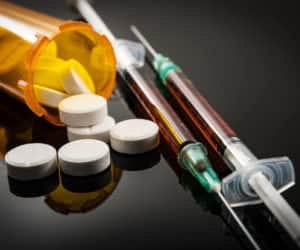5 Fast Facts About Opioid Addiction

These facts about opioid addiction will help you understand this devastating illness.
Opioid addiction takes a major toll on your life. It can damage your relationships, destroy your finances, and result in serious legal troubles. It also wrecks your physical and mental health and can quickly turn deadly. Here are some facts about opioid addiction you should know if you or someone you love is addicted to heroin or prescription painkillers.
What are the common signs of an opioid addiction? Click here to learn what to look out for.
1. Around 2.5 million Americans are addicted to opioids.
You’re not alone. Around two and a half million people in the U.S. have an opioid use disorder involving prescription painkillers like OxyContin and Vicodin. Another half-million have an opioid use disorder involving heroin.
An opioid use disorder typically involves both addiction and dependence, which aren’t the same things, although they typcially occur together. Addiction is characterized by the inability to stop using opioids even though they’re causing problems in your life. If you’re addicted to opioids, you may want or try to quit, but you’ll find that you can’t–at least, not for the long-term. That’s because addiction is the result of changes in the brain’s chemical functions and physical structures that lead to compulsive behaviors and dysfunctional patterns of thinking.
Opioid dependence is characterized by withdrawal symptoms that set in when you stop using. Dependence occurs as the brain changes the way it operates in order to compensate for the presence of the drug. This leads to tolerance, which means you need higher doses to get the same effects smaller doses once produced. At some point, your brain may begin to operate more comfortably when opioids are present. Then, when you try to stop cold-turkey, normal brain function rebounds, and this causes withdrawal symptoms that can be excruciating.
2. Opioids cause 115 deaths every day, but naloxone can prevent overdose death.
One of the most disturbing facts about opioid addiction is that opioid overdose deaths claim 115 lives every day. The U.S. government and other official entities stress the importance of opioid overdose prevention, which involves having naloxone on hand if you use opioids, whether or not you’re addicted or dependent. Naloxone is the opioid reversal drug, and it’s available over-the-counter in most states and by prescription in some states.
Naloxone is sold under the trade name Narcan, which is a nasal spray that’s easy to administer. Naloxone is an opioid antagonist that bumps the opioids out of the opioid receptors, which restores breathing to an overdose victim. Opioid overdose prevention with Narcan saves many lives every year, and having is medication on hand can save your life or the life of someone you love.
3. Opioid addiction is a brain disease, not a choice.
Opioid addiction almost always has underlying causes, such as physical or emotional pain, a co-occurring mental illness, chronic stress, or a history of trauma. While choice is a factor in the initial abuse of opioids, once addiction and dependence occur, choice is no longer an issue. This is one of the most important facts about opioid addiction that many people don’t understand.
Addiction is similar to other chronic diseases like diabetes and heart disease, which, like addiction, often develop as the result of unhealthy lifestyle choices. But once these develop, treatment is almost always needed to send the disease into remission. It’s the same with opioid addiction, which is entirely treatable.
4. Opioid withdrawal doesn’t have to be excruciating.
Many people continue using opioids because they’re afraid of going through withdrawal, which can be extremely intense and uncomfortable. But medical detox and medication-assisted treatment can help. During medical detox, which is the first step of opioid rehab, medications are given as needed to reduce the intensity of symptoms and shorten the time it takes to detox.
Medication-assisted treatment involves medications that prevent withdrawal altogether while helping to normalize brain function and reduce cravings so that you can focus on recovering from the addiction.
5. Opioid addiction is fully treatable.
Perhaps the most important of the facts about opioid addiction is that while addiction is complex, it’s highly treatable.
A high quality treatment program through WhiteSands Treatment involves a variety of traditional and complementary therapies that help you address the underlying causes of the addiction; develop essential coping skills for dealing with negative emotions, stress, and cravings; and re-learn healthy ways of thinking and behaving.
Recovering from an opioid addiction isn’t easy, but then, neither is being addicted to opioids. The good news is that treatment works, and it can work for you, too.
If you or a loved one needs help with abuse and/or treatment, please call the WhiteSands Treatment at (877) 855-3470. Our addiction specialists can assess your recovery needs and help you get the addiction treatment that provides the best chance for your long-term recovery.
